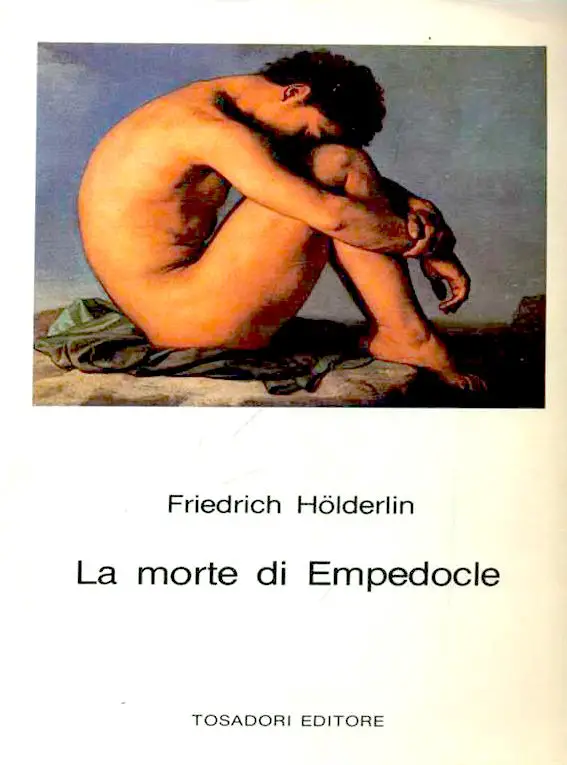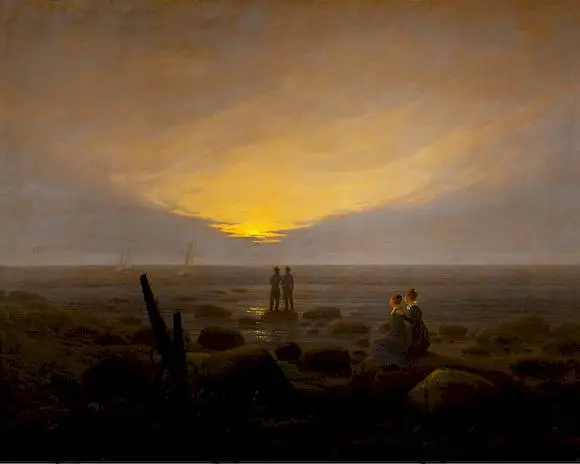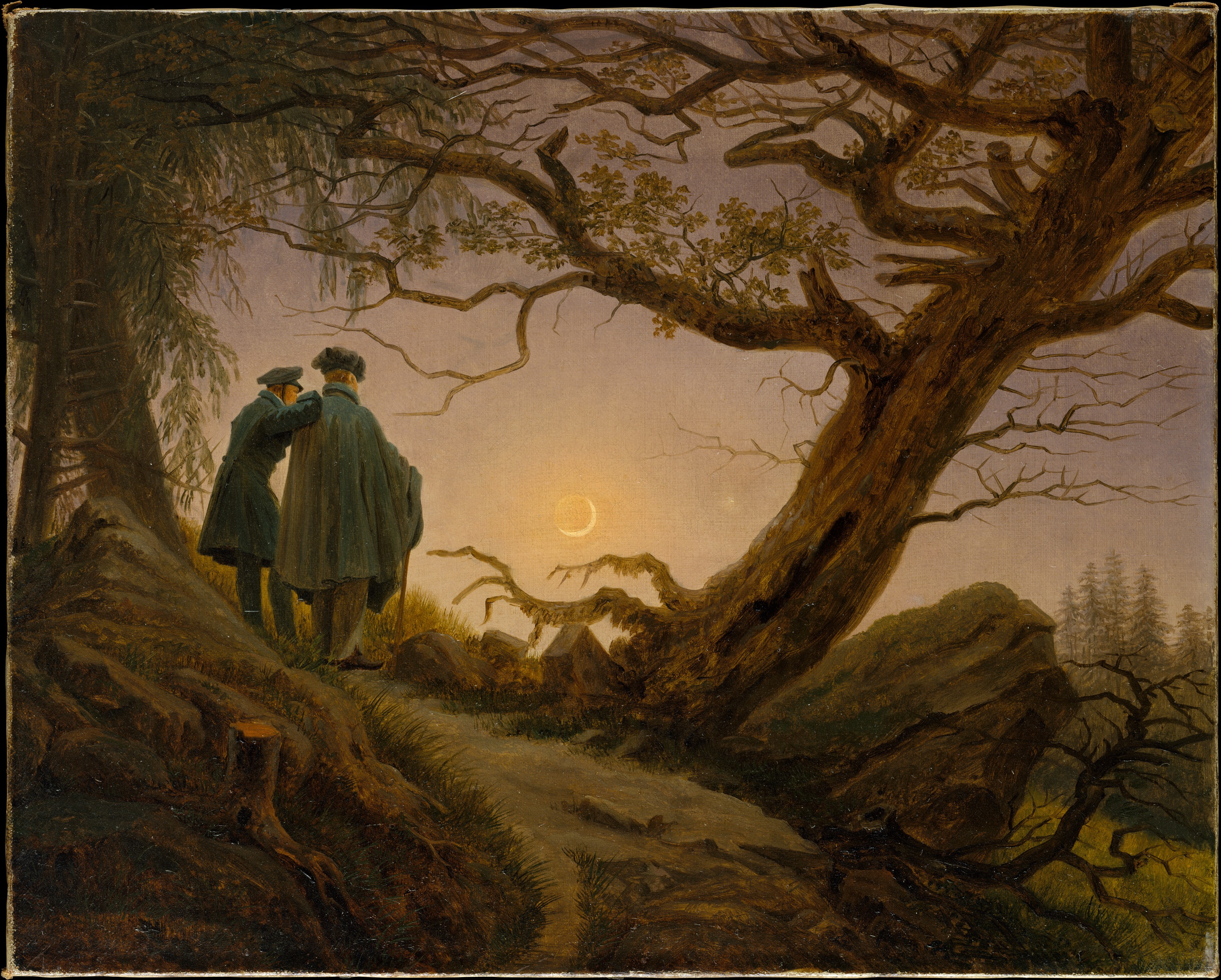In Friedrich Hölderin's "Death of Empedocles", a tragedy composed at the end of the XNUMXth century, the poet analyzes the drama of human solitude, the silence of Nature and the Gods, the unsolvable tension between aorgic and organic and the constant struggle of the individual so as not to be shipwrecked in the universal indistinct.
di Livia Di Vona
Cover: Caspar David Friedrich, “The Dreamer”, 1820-1840
Tragedy remained unfinished, of which we have three different drafts developed over three years, from 1797 to 1800, in a period in which the signs of madness are already evident, Death of Empedocles, by Friedrich Hölderlin, similarly toHyperion, moves along the thread of an elegiac nostalgia for Hellas. The figure of the Hölderlinian Empedocle, drawn on the basis of the legend that wants the suicidal philosopher in the fiery abyss of Etna, immediately deviates from the historical / legendary datum to become the archetype of the Poet, as Hölderlin himself represents him.
He is a poet who has fallen from grace, the man we meet when his world opens up before our eyes. Bent over by a tragic loneliness, only initially do we identify it with the expulsion from Agrigento when the people, now ungrateful, turn against him; as the narrative proceeds, this solitude coincides with the silence of Nature and the Gods. The aorgico, as the German poet calls it, no longer speaks and Empedocles is left without "love". The tragedy, in the state of raw material in the hands of its modeler, has been greatly altered, because the search for poetic perfection corresponds to a conception of the return to the One and the All in which, epilogue aside, Hölderlin himself seems to have identified himself.

From Adam to Tantalus
The rise and fall of Empedocles as a Poet relate to the tension between aorgic (Nature, Gods, Infinity) e organic (Art, finished); more precisely, they have to do with the function of the word in poetry, according to Hölderlin. Starting from the famous Heideggerian essay on Poem by Hölderlin - which also does not examine tragedies such as Death of Empedocles, but focuses on the lyrics - the rise and decline of the Poet coincide with two precise figures: Adam and, in the tragedy from here, Tantalus. Empedocles in maximum splendor is an Adam: by naming Nature and Gods, he abstracts them from the primordial Chaos and makes them intelligible, what Heidegger calls the foundation of being through the word (Worthafte stiftung des seins). From this moment, history becomes possible (History) and man can testify to his belonging to the earth [1]. By virtue of this testimony, of this belonging, man (the Poet) establishes a authentic interview with what he names:
“Since we are an interview ̶̶ man has experienced and named many gods. Since language occurs automatically as an interview, the gods come to the word and a world appears. But once again it must be observed that the presence of the gods and the appearance of the world are not a consequence deriving from the occurrence of language, but are contemporaneous with it [...] But the gods can only come to the word if they themselves they call and claim us. The word that names the gods is always a response to this call. " [2]
Empedocles reaches the highest poetic peaks only as long as he manages to keep aorgic and organic contemporaries, Nature and Art. In fact, the foundation of being in the word does not at all mean abstracting the named deities from nothing; as Heidegger himself explains to us, it means that the deities themselves suggest to the Poet the words with which he calls them. Both exist simultaneously and the Word is the medium through which Poet (man) and Gods or Nature (according to the pantheistic view) coexist in the world. And time becomes history thanks to the presentification of the aorgic, operated by the word. By naming them, things can finally be fully what I am; the Entity can be known for what it really is. In this sense we speak of an essential word [3], and Being can reveal itself as event's audience (ereignis).
In the automatic occurrence of language, Hölderlin tells us that the man / Poet lives his life happily, because he is in the presence of the Gods, he lives in unity with them. Yet something dramatic has happened and it is no longer possible for Empedocles to enjoy the ancient joy, that is, authentic intimacy with the aorgic. The broad passages of the cry of the Hölderlinian poet, in the text of the first draft of the work.
“[…] O intimate nature, which you are before me, do you no longer recognize the friend, the beloved, do you not recognize in me that priest who offered you his song of life as blood sacrificed with joy in sacrifice? […] I am alone? And is it night up here also during the day? Alas, he who more than any other looked up, now gropes blinded ... My Gods, where are you? Do you abandon me as a beggar? And have you repudiated this heart that lovingly foretold you, have you tightened it in ignoble bonds, he who was born free, who existed for himself and was not subject to anyone? And should I put up with all of this? Like the weak who in the terrifying Tartarus are nailed, day after day, to the ancient punishment? [...] I knew you well, I acted with you, according to what my spirit, guided by you, dictated to me, such I knew you, such you lived in me ... Oh no! It wasn't a dream; with my heart I felt you, silent ether, when human error gripped my soul and you, great conciliator, healed me with your breath. […] The fault is yours, miserable Tantalus. You defiled the sanctuary, with arrogant pride you broke the covenant. When the geniuses of the world, o wretched one, merged in you in love, you thought of yourself alone and you deluded yourself, you mean fool, that the celestial, the benign, had sold themselves to you as foolish slaves. [...] " [4]
Again, it is the priest Hermocrates, who left Agrigento to unmask him definitively in the eyes of the people, who in an afterthought, wants to cancel the previous abjuration, to clarify what happened.
“The Gods loved him very much, but he is not the first that they later rejected in the darkness of unconsciousness from the heights of their favor, because in the excess of his fortune he too forgot distances and considered himself unique; so he was punished with infinite loneliness. […] Dangerous dreamer, he affirms, like the arrogant old men who migrate through the streets of Asia, who once gave birth to the Gods from his word. Then the immense, living, opulent world stands before him as a lost property of him, and immense cravings burn in his breast, and this flame, wherever it strikes, opens a way. [...] " [5]

The reason for the fall of Empedocles therefore lies in the interruption of the authentic conversation between himself and Nature / divinity. The contemporaneity between aorgic and organic (word) and his has been broken sin of hubris, for which he is seeking atonement, lies in having made language the prius temporal: the word evokes the Gods by pretending to give them life. No longer a witness (since language no longer occurs in the Heideggerian meaning), but creator of the surrounding world. It is the end of happiness on earth; it is the claimed victory of the particular (Empedocles or man) over the universal, which is forever precluded from him. As a Tantalusnow the world stands before him like an agonizing Tartarus and the days when, like Adam, he knew how to read Nature, appear distant. Not One and All, but only one, a lost atom, unable to poetically inhabit the world, or to enter into a relationship without pretending to dominate it.
Also Pausanias, the favorite pupil, who tries to keep Empedocles from the tragic epilogue of his destiny, contributes to further clarify the pain of his teacher when, heartfelt, he tries to bring him comfort:
"From your actions I knew you, when in the barbarian state you gave form and meaning and I experienced the power of your spirit and of your world when one of your words, in the consecrated instant, gave rise to many years in me and then a 'was new and beautiful; and like the meek deer who think of their native land when it turns the forest away, so often my heart beat if you spoke of the happiness of the primitive world, and perhaps you did not sketch the future years in front of me, as does the artist who Does he insert an element into his picture and fill the gap? " [6]
Empedocles is troubled by the words of his pupil, because Pausanias, without understanding him, venerates that arrogance that led him to perdition. “Consecrated instant” means this: the priest consecrates in the sense that he gives life to what has no existence of its own. What Pausanias admires and which she longs for is what Empedocles contemplates expiation for. As mentioned, the contemporaneity between aorgic and organic has been interrupted, the kinetic tension (Still stand of the Bewegung - stay still in the movement) between universal and particular, for which the second must not perceive the first as an opposition, but as its destiny, without, for this reason, renouncing to be what it is, namely particular. The mortal sin of Empedocles it resides in the claim to confer primacy on the organic, on the word, determining the eclipse of the Gods.
The estheticologist Rosario Assunto writes, to whom we owe the translation - dated 1948̶ of passages chosen by the Hölderlinian essays on Foundation of poetry, that naming things, like an Adam, means drawing them forever from the trap of ephemeral matter to deliver them to eternity:
"Adam appears to us as a poet, in the etymological sense of the word, (poet, ed) creator of things insofar as he names them and, in naming them, heals the rift between himself and the other that stands in front of him as an opposite, recognizes that this is not his negation, as both agree in the objectivity that is declared in language. " [7]
Assumed, unlike Heidegger, he attributes excessive power to Empedocles (the Poet): by naming things, drawing them from an indistinct Whole, the Poet becomes their creator. But having made the world his artifice condemned it to the silence of the Gods. Furthermore, Assunto offers us an esthete Hölderlin, in the sense of considering aesthetics an integral part of ontology: beauty "is absolute presence, guarantee of truth, indeed one with absolute truth" [8]; the Messkirch philosopher, on the other hand, considers aesthetics within the confines of metaphysics.

The return to the One and the All. Etna as a symbol of the center
The individual (the man / Poet) stands in front of the orgic, or the Universal in constant tension. IS a struggle not to be shipwrecked in an indistinct universal, in which trace of one's own particular raison d'etre is lost. The incompleteness of the Death of Empedocles is revealed in this lack: the vertigo of the fatal leap into the Etna fire is not described, even if it makes it a foreshadowing. Mount Etna does it have a specific symbolic meaning in the economy of tragedy? The German poet writes in Foundation of Empedocles:
“This feeling represents, perhaps, the most elevated one can feel, when the two opposites, man made universal and spiritually alive, made aorgic in a genuine way by art, and the beautiful form of nature meet. This feeling is perhaps the most sublime that man can experience, because […] their union is more infinite. At the center is the struggle and death of the individual, that moment in which the organic lays its individuality, its particular existence, which had become an extreme, and the aorgic lays its universality, not in an ideal mixture, as at the beginning, but in an extreme and real fight. " [9]
This extreme and real struggle, writes Hölderlin, is fought with the stake at stake conquest of a center, which will be different from that of the original unit. Originally, that is, Nature and Art lived in confused unity. When language has reached a greater degree of differentiation, naming Nature, transforming it into culture, Empedocles "most distinguishes, thinks, compares, creates, organizes and is organized when (ed) is less present to himself and to the extent that he is less self-conscious " [10].
A greater degree of differentiation corresponds to a greater involvement within the limits of one's own era. The German poet, on the other hand, wants to save Empedocles' individuality from these limits, and the sacrifice on Etna it constitutes the necessary path for the fulfillment of his freedom as a Poet. On his slopes the pacification will take place: the aorgic will lay down its universality and the organic will lay down its particularity, exchanging the action: the organic will universalize and the aorgic will reach the opposite end, individualizing itself. What will happen after the volcano has swallowed Empedocles will not be retreating to the original one, but will be proceeding towards a new unity; the first, which is ideal, proceeds "more as a function of the whole than of the individual", on the contrary the second, which instead moves from the passions of the individual [11].
In Hölderlin there are, therefore, two types of unity: the ancient or original, which pervades tragedy as an intellectual intuition, therefore ideal and which makes use of the word; and that which, through the death of the poet, overcomes poetic language and repairs the rupture of the original pact between aorgic and organic. The contrast between the continuous tending and lingering of the spirit is the struggle of the Poet caught in the plots of a contingency not animated by divine breath, of which he is emperor without scepter: there is no'love, extinguished with the abandonment of the Gods. Not for long.
“Here I remain, serene, since the new hour, long established, is preparing for me. No longer in image, not as always, in the fleeting fortune of mortals, but in death, I discover the living. " [12]

Note:
[1] Martin Heidegger, Hölderlin's poetry, p. 44, Adelphi, Milan, 1988
[2] Ivi, p. 48-49
[3] M. Heidegger, therein, p. 50
[4] F. Holderlin, Death of Empedocles, p. 62-73, (First draft) Trad.it Ervino Pocar, Garzanti, Milan, 2005
[5] Ivi, p. 35
[6] Ibid, p. 26
[7] F. Holderlin, Essence of poetry, p. 6, Solfanelli, Chieti, 2019
[8] Ivi, p. 50
[9] Ivi, p. 29
[10] F. Holderlin, Aesthetic writings, page 87, SE, 2004, Milan
[11] F. Holderlin, Ibid. pg. 128
[12] F. Holderlin, Death of Empedocles, p. 209, (third draft), Trad.it Ervino Pocar, Garzanti, Milan, 2005

2 comments on “Empedocles according to Hölderlin: rise, decline and redemption of the Poet"